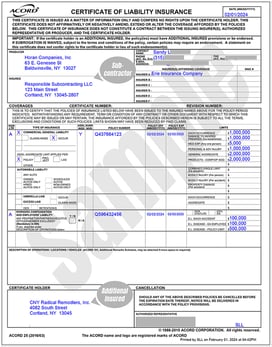Top 5 Reasons Subcontractors Need Their Own Insurance
February 14th, 2024
6 min read

As a contractor, you know how hard it is to find good subcontractors. You want to hire people who can do the job well, on time, and on budget. But you also want to protect yourself from the risks and liabilities that come with hiring subcontractors.
You don’t want to pay for their mistakes, injuries, or lawsuits. And you don’t want to lose money, reputation, or insurance.
That’s why you need to request that your subcontractors obtain their own liability and workers comp insurance.
We are the Horan insurance agency. We’ve been working with Central New York contractors like you since 2009. We can help you avoid subcontractor disasters and keep your business protected.
In this article, we will explain the top reasons why you need subcontractors to get their own insurance, and how it can benefit your business. We’ll show you how this is a smart and proactive risk management strategy.
If you’re a contractor who hires subcontractors, you don’t want to miss this article. It could be the difference between a smooth and profitable project, and a nightmare scenario. Continue reading to learn more.
Reason #1: Contractors Need to Avoid Extra Risks and Liabilities
As a contractor, you’ve insured your business and done the right thing. You’ve done your due diligence and found the best insurance for yourself. Why would you hire a subcontractor who hasn’t done the same? Why would you take on unnecessary risk for someone who your insurance is not meant to cover? Someone you know nothing about.
You have no idea what their insurance history or loss history is. But you do want to know if they have insurance. So the first reason to require subcontractors to have their own insurance is to protect your own business.
Subcontractors are not employees. If you wanted to hire them as W2 workers, you could cover them on your insurance. But that’s not what a subcontractor is by definition.
You Could Be Left Paying for Damage You Didn’t Cause
Imagine you hire a flooring subcontractor to install hardwood floors in your client’s kitchen, but they do a terrible job. They use the wrong type of wood, cut it unevenly, and leave gaps and exposed nails everywhere. Now, you’re facing a tripping hazard and a code violation.
But wait, it gets worse! The subcontractor, who you didn’t have time to properly vet, doesn’t have flooring insurance and wasn’t part of your original contract with the client. Your client is furious and threatens to sue you for breach of contract.

This is exactly why requiring subcontractors to carry their own insurance is crucial. They’re independent businesses responsible for their actions, and if something goes wrong on the job, their insurance should cover the damages, not yours.
Think of it this way: subcontractor insurance acts as a safety net, protecting you from unexpected financial burdens and legal headaches. It ensures everyone plays by the rules and operates with clear financial boundaries.
By requiring your subcontractors to have insurance, you’re essentially saying: “Hey, I trust you to do a good job, but accidents happen. Let’s make sure we’re both covered if something unexpected comes up.”
It’s a win-win situation for everyone involved. You have security knowing you’re protected, and your subcontractors can focus on doing their job without worrying about leaving you with a financial mess.
So, the next time you hire a subcontractor, make sure they have their own insurance. It’s a small step that can save you a lot of trouble down the road.
Reason #2: Contractors Need to Maintain Their Client Relationship
You have a contract with your client. You and your client have agreed on the work, the cost, and the expectations. Your client has no relationship with your subcontractor. Unless your subcontractor has made a separate deal with your client, which is unlikely, your client only trusts you to do the job.
What usually happens is that you hire subcontractors to help you with the work. You might hire
- painters,
- plumbers,
- electricians,
- carpenters,
- flooring experts,
- and so on.
You tell them what to do and agree on payment terms. You don’t involve your client in this process. But what if your subcontractor is uninsured and gets injured on the job? Now you have a big problem. You’ve breached your contract with your client.
Your client has no obligation to the subcontractor. The subcontractor has no protection from you or your insurance. The subcontractor can sue anyone they want. They can sue your client, which will ruin your reputation.
Now say you hire an uninsured electrician for a project and they get injured on the job. Since they lack workers compensation, they might seek compensation from any available source, including:
- Your client’s homeowners insurance: This could trigger a contractual breach, as your agreement with the client likely stipulates that you, the contractor, hold responsibility for any damages or injuries incurred during the project. Not only does this strain your client relationship, but it also exposes them to unnecessary financial burden.
- Your general liability insurance: While meant to cover general risks, it wasn’t designed to handle subcontractor-related injuries. Using it for this purpose could violate policy terms and potentially lead to claim denials.
By requiring subcontractors to have their own insurance, you effectively avoid these risks:
- Subcontractors secure workers compensation, ensuring they receive proper care without involving your client or your insurance.
- It protects you from contractual breaches and potential lawsuits from clients by clearly outlining responsibility for any mishaps.
Reason #3: Contractors Need to Avoid Subcontractor Disasters
Your subcontractor might also bring more people to help him. But those workers aren’t subs, they’re just helpers. Regardless, they’re still your problem. You’re responsible for everyone who works on your project. You have vicarious liability for all their actions. And you’re risking a lot by letting them in. The sub or his helpers might not get hurt, but they might cause damage to the property.
Imagine this: You hire a plumber named Bill for a bathroom remodel in Rome, New York, trusting he has insurance. Turns out, he doesn’t. His “helpers” do shoddy work, causing a major leak that floods the client’s basement and ruins valuables. You're stuck with the mess, costly repairs, and a furious client.

Uninsured subcontractors are liabilities, not assets. Requiring their own insurance protects you from:
- Financial burdens: You won’t be the first line of defense for their mistakes.
- Client headaches: You maintain trust and avoid contractual breaches.
- Legal troubles: Responsibility stays with them, not you.
Protect yourself, your business, and your clients. Insist on subcontractors getting their insurance.
Reason #4: Contractors Need to Comply with Workers Comp Laws
You have to be careful with this one. It can get you in trouble if you don’t follow the rules. Especially in New York State. If you work for commercial clients, they will ask you to have workers comp insurance. If you don’t, they’ll have to put you on their policy. And they don’t want to do that for two reasons:
- It’s expensive.
- Their policy isn’t designed for it and will lead to a likely non-renewal by their insurance provider.
So you get your own workers comp insurance. But it’s not cheap for contractors. And you have to make sure your subs have workers comp too. You can’t hire an uninsured sub without workers comp. That would break your contract with your commercial client.
You agreed to have workers comp for everyone who works on the project. If you bring in people who don’t have it, you’re in breach of your contract. And you’re risking a lot of problems. This is another reason why you need to require subcontractors to have their own insurance.
It keeps you from breaching your contract with your commercial client. And it keeps you from breaking the workers comp laws.
Reason #5: Being Added as an “Additional Insured” on Your Subcontractor’s Insurance
While your subcontractor should have their own insurance, you should be added to it as an additional insured and a certificate holder. They must have insurance for you to do that.
 In a sense, you’re their client, and you want to be on their insurance. You want to have control and protection. And you want to make sure their policy is active and valid.
In a sense, you’re their client, and you want to be on their insurance. You want to have control and protection. And you want to make sure their policy is active and valid.
The only way to do that is to be added to their policy when they request it. A certificate of insurance is not enough. A certificate can be outdated. You want to say, put me on the policy as an additional insured. I want to see my name on it as a certificate holder.
This protects you as the contractor from lawsuits and injuries. If something goes wrong on the job site, you’re covered.
Help Your Subcontractors Obtain the Right Insurance So You Can Get the Job Done
By requiring your subcontractors to carry their own insurance, you’re building a fortress of protection around your business. You’re shielding yourself from the risks and liabilities that come with hiring subcontractors.
Requiring subcontractors to carry insurance isn’t a luxury, it’s a necessity. It helps you maintain client trust and comply with state requirements. It saves you from costly lawsuits, settlements, and damage to your reputation. It gives you composure and security.
Horan is here to help you. We know the ins and outs of subcontracting, as well as the insurance that is required in New York State. We can help your subcontractors get the policies they require to help you get the job done.
Don’t wait until it’s too late. Don’t risk your business, your reputation, or your insurance. Contact Us to discuss insurance options for your subcontractors.
Daniel is an accomplished content creator. He has been working in publishing for almost two decades. Horan Companies hired Daniel as its content manager in November 2022. The agency entrusted its messaging to him. Since then, Daniel has written insurance articles, service pages, PDF guides, and more. All in an effort to educate CNY readers. He's helping them understand the world of insurance so they can make informed decisions.
Topics:



























